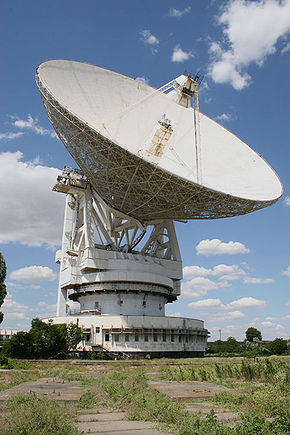Tau Zero journalist Larry Klaes has been fascinated by SETI — and its offshoot METI (Messaging to Extraterrestrial Intelligence) — for a long time now. Here he steps back to look at METI in context, offering up an examination of the advantages of sending signals to the stars and the offsetting risks. We’ve looked at many viewpoints on the subject in these pages since Centauri Dreams came online in 2004. But has Larry hit upon a key fact that may trump the arguments of both sides? Is there something about human nature that makes METI more or less inevitable?
By Larry Klaes
SETI, or the Search for Extraterrestrial Intelligence, has been conducted by a variety of professional and amateur scientists since 1960 (or 1924 if you want to count a campaign that year which listened for any radio messages from the presumed natives of Mars). SETI primarily involves the passive listening or looking for transmissions from alien civilizations. More recent SETI projects have also attempted to detect the massive technological activities of really advanced societies in our galaxy and beyond or any probes that might be lurking in our Solar System quietly monitoring humanity.

Our present level of space technology does not allow us to directly explore even the nearest star systems. As for the numerous if often sporadic SETI programs that have been operating around and even beyond our globe for the last fifty years, they rely heavily on either an alien society deliberately signaling us or our own luck in picking up a stray transmission from one of them. Throwing in the fact that our Milky Way galaxy holds hundreds of billions of star systems has some scientists advocating a less passive approach to learning if Earth is the only planet with intelligent life or not in the Cosmos.
Image: The Evpatoria RT-70 radio telescope and planetary radar at the Center for Deep Space Communications in Ukraine. Credit: S Korotkiy.
Dubbed METI, for Messaging to Extraterrestrial Intelligences, this concept involves transmitting our own messages and beacons into the galaxy to alert alien societies to humanity’s presence to make it easier for them to find us and respond in kind. As might be imagined, there has been plenty of debate over whether METI is the right way for humanity to find alien intelligences or if it will only make a malevolent species aware of Earth as a target of conquest and destruction.
In order to make some determination whether METI is humanity’s path to becoming a productive and progressive part of the galactic community or the route to our doom, let us look at the pros and cons of what also goes by the name of Active SETI.
The Nature of the Universe
The Milky Way is a huge spiral galaxy containing 400 billion star systems spread across 100,000 light years, with most stellar residents of this cosmic island averaging several light years apart. To give the reader an idea just how vast the Milky Way is, if our entire galaxy were shrunk down in scale to where a person could hold the entire Sol system in the palm of their hand, the Milky Way would still be the size of the North American continent.
In addition to the great number of stars and the incredible distances between them, SETI researchers also have to contend with the natural cosmic radio background which drowns out all but the strongest of artificial signals. Interstellar dust, which weaves its way throughout our galaxy, also blocks out many electromagnetic signals and whole regions of the Milky Way from our view.

Image: The galactic centre itself is totally hidden at visible wavelengths by the band of dust which divides the Milky Way along much of its length. The dust lane is only visible because it blots out background stars. Embedded in the dust are many star-forming regions, seen as bright red emission nebulae. Credit: Anglo-Australian Observatory.
Humanity also has no real interstellar capabilities at present. The few deep space probes that have been sent on courses outside our Sol system would take 77,000 years to travel the distance to Earth’s nearest stellar neighbors, the Alpha Centauri star system.
None of the currently active robotic explorers will function more than a mere fraction of that time before expiring. Now it is true that our civilization has been producing a “bubble” of electromagnetic signals for over one century which has formed a 200 light year wide sphere of artificial signals in the galaxy, with Earth at its center. However, most of these transmissions were only meant for residents of our planet and thus were most often unintentionally aimed but briefly at random areas of the sky. They also tend to be rather weak signals, requiring a very large and sophisticated receiver to detect them even just a few light years from Earth. In short, humanity is hardly a standout in the grander cosmic scheme of things.
Why METI Will Benefit Humanity
To combat these odds to make SETI a success, humanity needs to start broadcasting our presence into space, deliberately targeting particular systems and other places in the Milky Way we think may be good places for finding our celestial neighbors. The transmissions could be as simple as a signal that clearly distinguishes itself to be artificial or a detailed introduction about ourselves and our world. Another suggestion is to have interstellar beacons continuously broadcast across the heavens for long periods of time to cover as much of the sky as possible, since we do not exactly know where alien societies may exist or how often they may be conducting their own SETI programs.

Any extraterrestrial intelligences which can find us by our METI programs and respond will likely be more advanced than humanity. This means these ETI will know more and be able to undertake activities which our species cannot do at present. We may therefore learn new things across many disciplines and improve ourselves both socially and technologically. Alien civilizations may also benefit in turn from information we share with them.
Image: Aleksandr Leonidovich Zaitsev, METI advocate and radio astronomer, whose messages to the cosmos include the 1999 and 2003 ‘Cosmic Calls’ from Evpatoria. Credit: Wikimedia Commons.
In regards to concerns about alerting to our presence any species that may want to harm humanity, Carl Sagan once postulated that hostile societies will probably either destroy or degenerate themselves before they can ever achieve interstellar flight. This would mean that any ETI who can detect and contact us would be benevolent or at least impartial, with the extra security of being very far away.
Even if some ETI are a threat to our existence and can also move between the suns, we may learn of this danger through the evidence of their own activities and transmissions or from other ETI who know of the threat they pose and are warning those societies they are aware of to beware of this or any other galactic danger. Being forewarned, we may have a chance to defend ourselves or perhaps form an escape plan working with our newfound allies to combat the immediate threat and form a mutual relationship between our worlds later on.
Interstellar travel, especially the kind which can achieve relativistic speeds, may be even more difficult than we currently realize. Certainly it is not obvious from Earth that large numbers of great starships are zipping about the galaxy on a regular basis. At the least this should give us some protection thanks to the incredible distances between star systems. METI would be the way that the sophisticated cultures of the Milky Way communicate, learn about, explore, and trade with each other, all from the relative safety of their home worlds.
Why METI May Doom Humanity
The biggest negative for METI is one that even members of the general public who do not study this subject are aware of through the popular media: Alerting an advanced alien intelligence to our presence in the galaxy could cause them to interact with us in ways that might harm or destroy our society and our species.
Historians and others cite the many examples in human history where the encounter between two different cultures with disparate technological levels often led to either the reduction or destruction of the less sophisticated society, even if the losers outnumbered the superior culture in population size.

Even if the historical encounter had not been one involving conquest or extermination, other factors often contributed to the demise of the native population. As just one example, unfamiliar diseases introduced into the native populations have killed more people than outright warfare in many cases. Missionary ventures and casual introductions have altered target societies so that if they do not disappear altogether, they become assimilated into the dominant culture until their bear little resemblance to their original selves.
Image: Science fiction author David Brin, one of METI’s most persistent critics. His 1983 paper “The Great Silence” offered an early look at the Fermi paradox and its implications for SETI. Credit: Contrary Brin.
All these scenarios and more have been suggested and feared in regards to making the galaxy take notice of humanity. Claims that any ETI who possess sufficient astronomical instruments may already know of Earth and its occupants through our electromagnetic leakage and even biological signatures have been countered by evidence that most of our radio and television signals are too weak on an interstellar scale to be detected by all but the most powerful devices. Even military and planetary radar beams, which are much stronger signals, are not aimed at specific points in space beyond our Sol system, reducing their chances of being noticed by ETI.
While we fret over a potentially dangerous response from the Universe, there is also the possibility that our METI efforts might cause similar harm to alien intelligences that may not be ready to deal with what we might have to say or even that we exist at all. We hope that an ETI will recognize that we are a relatively young society still struggling with our own issues and will leave us alone until we mature enough to properly interact with other galactic residents. However, there is also the possibility that an alien mind may not recognize us as developing and naive and could just as easily either take advantage of our weaknesses or complicate our lives by attempting to “help” us.
The Futility of Fighting Human Nature
One thing is certain, something that has already been happening for a while now: Though it may be prudent to think twice before sending any kind of information about ourselves into the Milky Way, there will always be those who defy the rules even if it is just for the sake of committing the act for itself.
There are now five deep space probes (and their last rocket stages) heading out of our Sol system into the wider galaxy. Four of these automatic vessels have suitable information packages aboard, while the newest member of this exclusive club, New Horizons, is carrying less sophisticated offerings to the Universe, with the exception of some of the ashes of Clyde Tombaugh, the man who discovered Pluto in 1930, the dwarf planet that New Horizons is on its way to briefly explore in 2015. The engraved plaques and golden records aboard the twin Pioneer and Voyager probes, respectively, were constructed and placed there largely by people outside the space institutions which made the probes possible, making up for a lack of foresight by the vessels’ creators. The New Horizons team eschewed any such project altogether, treating items for the probe like they were storing them into a small town’s time capsule.
As for METI in the radio realm, deliberate messages have been sent into the galaxy starting in 1962 with a brief Morse code transmission by the Soviet Union and then in 1974 with the more famous Arecibo Message to the globular star cluster Messier 13. There have been a number of other such METI efforts since then. A fair number, such as a series of transmissions from the Evpatoria facility in the Crimea, are serious, but others have been largely publicity stunts, such as hawking science fiction films and snacks. Most of those involved in these projects have not shown any great concern for the potential consequences of revealing ourselves to the Cosmos. This attitude is even stronger when it comes to the electromagnetic leakage our civilization has been producing for over one century now, celestially weak as most of it is.
A number of individuals and groups feel they have been underrepresented or not represented at all by the messages and offerings from past METI efforts, so they have sent their own broadcasts into the galaxy despite protests by others. Aleksandr Zaitsev is among the better known of these individuals who has utilized his position as chief scientist at the Russian Academy of Science’s Institute of Radio Engineering and Electronics to send detailed transmissions to a number of nearby star systems using the Evpatoria radio telescope. Zaitsev continues to perform and advocate these METI despite protests by others in various fields. Zaitsev counters that this is just what humanity needs to do if it ever wants to survive and mature as a species.
The fact is that while we must be careful how and if we should represent ourselves to the vast unknown that is the rest of the Universe, there will always be those people who defy the rules and regulations, be it out of a sense of duty to all humanity or just for the sake of rebellion against society. The next question is, do at least some other minds in the galaxy also think and act this way? Is just such a transmission on its way to Earth? What will be the consequences then? Will it make us finally grow up as a species, or will there be panic and doom? I welcome your thoughts on this important matter.



Alexander Zaitsev said on May 9, 2011 at 23:55:
“There are two different things – a radio telescope and RADAR telescope.
To send METI messages we need RADAR telescope, while China built an ordinary radio telescope…”
My apologies for not clarifying. I am assuming the Chinese FAST telescope will have radar capabilities as well as radio, to track NEOs and other space objects if nothing else.
By the way, does anyone know the official (or unofficial) Chinese stance on SETI and METI? The communist government of the Soviet Union was quite big on SETI back in the day, so perhaps at least ideologically they would have no issues with these fields.
Considering China’s long history of astronomy and their growing space program, searching for and signalling alien intelligences should be looked upon as another feather in their cap. Unless they would feel threatened by a more powerful species, which is one of several reasons why SETI and METI are not as pursued and supported as much otherwise.
Hi Chris T;
I believe you have made good points. It is likely the case that some ETI would be hostile while others might be altruistic with still others lying somewhere between these extremes.
We as the civilization of humanity are not adversed to contemplating super-human intellegences that act in morally evil manners. While no attempt is being made to promote spiritistic or religious belief systems here, I mention the notion of fallen angels as the bodiless purely spiritual creatures from many major faith based systems on Earth. If more than 1/5 of the Earth’s population can make such an abstraction, then the idea of bodily creatures with super-human intellegence that act in morally offensive manners is not un-intelligable.
Note once again I am not promoting any faith based system here, but instead am merely drawing a reference to the abstractive schemata that our civilization has managed to produce in a systematic and organized manner to suggest that the idea of hostile ETI should not be dismissed as impossible.
I previously commented on how unlikely it was that other ETIs showed true altruism, and I have since noticed how often in these debates ‘nice’ is seen as synonymous with altruism. To me this is quite wrong, and I note the empathy and an evolutionary impetus to develop towards having a Theory of Mind are indicated as useful in a predatory species (since it enables them to be able to predict the behavior of their prey)
To me the most obvious example of what empathetic ETIs lacking altruism would look like is in the incredibly unlikely case than human flesh turns out to be a taste sensation. In that case humans might be destined to become the most biologically successful animal in the galaxy. Absolved of the stress of having to solve life’s problems ourselves, and nutured and protected from learning our eventual fates by nice caring ETIs we may also become the happiest intelligent species in our galaxy.
On reflection I’m with Ronald. I think it is jumping the gun to go all out for contact, until we have a much better handle on what is the situation “out there”.
What’s more, it’s a waste of resources, because the targeting efficiency, at the current stage of knowledge, will be poor.
Our ancestors were forced to evolve intelligence by environmental change that favored those who could invent their way out of the problems. That means intelligent life only evolves at worlds with changing environments (do not come babbling about the error of generalizing from one sample, the exact sequence of climates may differ, but the non-fixedness as such is theoretically provable to be necessary for the evolution of intelligence) and while different beings may prefer different environments, changing environments would not be very hospitable to anyone, so colonists would prefer worlds that do not evolve native intelligent life. This is described in “Environmental change and intelligence” on space colonization wiki. As for diseases, it would be possible to sample all cell types in the body of a being, and then use that cell culture and a damage detector to detect any disease that could harm that being, because that system only have to detect the damage and are therefore not bound by the need of already knowing the pathogen. The abundance of resources and real estate in space would eliminate competition, and intelligence instrumentalizes behavior so that no build-up of any so-called “aggressive drive” can occur in any being of monkey level or higher intelligence. The lack of competition would also eliminate the motifs for deception, so dogmatic teachings that are sustained by power struggles will disappear in the true spacefaring era, meaning all analogies to terran missionaries damaging cultures is bullshit. And the comment about outside ideas destroying cultures also ignores the distinction between censorship-based tyrranies and truly open cultures, a society that cannot handle the non-coercive mass-introduction of a new idea deserves to be overthrown by its own members, and those members deserve to know the idea. So METI and space travel is okay.
Martin J Sallberg
I wish I could be so sure as you!
Like we said above, the Fermi Paradox may be evidence, right before our eyes, that there is something wrong out there. We’ve been left alone so far, perhaps because we have not tripped some trigger yet.
It’s not right that a small minority of the population can unilaterally take it upon themselves to loudly announce our presence. OK the berserker theory is unlikely I agree, but the stakes are so high we need a lot more information than we have currently.
Robotic Emissaries to the Stars
Posted on July 18, 2011 by launiusr
Five spacecraft from Earth are currently moving out into the stars. After their operations cease, these spacecraft will continue to coast indefinitely.
None of them will come close to any known stars, and it is unlikely they will encounter any star systems for at least for millions of years.
Full article here:
http://launiusr.wordpress.com/2011/07/18/robotic-emissaries-to-the-stars/
A brief Top Ten list of METI efforts here:
http://www.innovationnewsdaily.com/top-space-alien-communications-1962/
I think whoever wrote about the DVD on Kepler (Item 1 on the list, surprisingly enough), did not quite get what the disc or mission are all about. The only way an ETI is ever going to encounter it is if they come to our Sol system, as Kepler is not going anywhere beyond it.
I also want to know just how long a DVD will last in space? Even assuming a future finder could read it, would the cosmic radiation destroy it before then? I have read that DVDs and CDs have a lifetime of just a few centuries at most when exposed to space.
That is why the two Voyager records have a much better chance of survival: Their information is engraved on the disc and one can at least hear the music and sounds by using the accompanying needle and spinning the record.
The transition from Type 0 to Type I civilisation (in Kardashev scale) is speculated to be risky, and could explain the Fermi Paradox, and we are about to undergo this transition in the next hundred or so years. Finding another civilization and sharing experiences could help us avoid our self-destruction because of stupidity.
The nearer the civilization, the less risky it seem to try contacting them, because if they are at least a little bit (say, +20~100 years) more advanced than us, they are almost surely aware of Earth through larger and more sophisticated telescopes, and are able to send interstellar probes to it. Only +300 years more advanced civilization than our (assuming exponential growth of technological advancement) could possibly have capability of colonizing Earth. However, we see no signs of Earth colonization by ET, meaning that at least the civilizations in the nearest star systems, if they exist, are either insignificantly more or less advanced than us, or are not malevolent to us.
I thus don’t see that it would be very risky to try and send a message to Alpha Centauri. The potential reward, however, in case of a successful contact, could even be a very exciting possibility of having the interstellar internet, with 8.6 year lag.
I have no read all the comments. I only want to write a sort of metaphor. Consider a good natured peasant, looking for new land to cultivate and feed his family. He finds a nice piece of it, but there is a little ants’ colony there. What do you think he will do. He’s a good man, he loves his family, respect private property of women and men, accepts hard work for a living, and even helps the orphans and the widows. Yet, what do you think he will do with that ants’ colony???